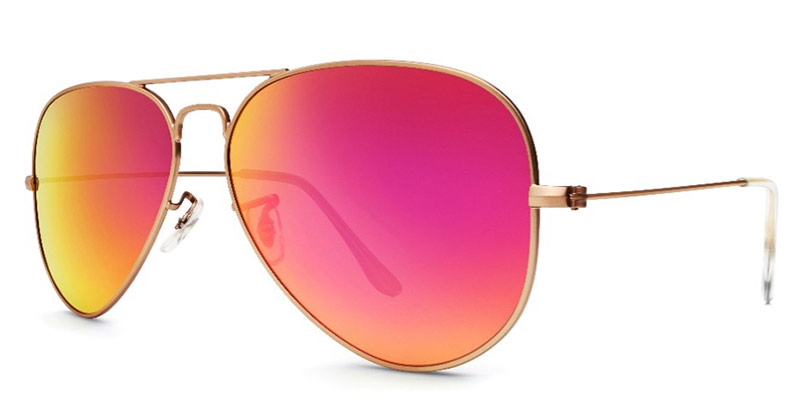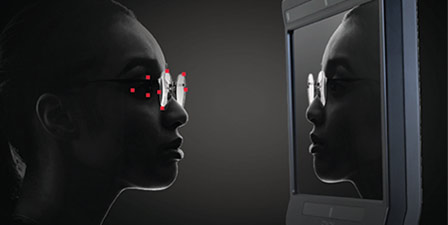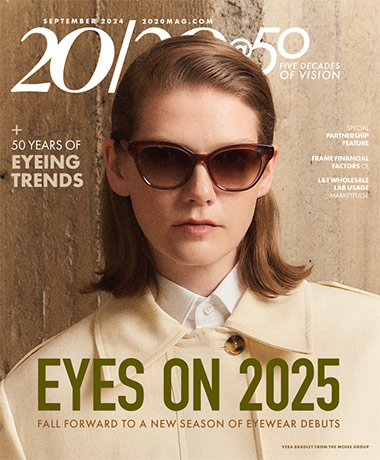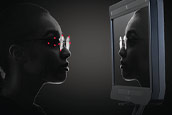By Mathew Guy Musladin, ABOM

Mirror coatings, are they just cosmetic enhancements, or are there real ophthalmic benefits to the addition of these IR coats? So what are mirror coatings exactly? Scientifically speaking they are oxides that are deposited on a lens surface usually using a vacuum process whose thickness is half the wavelength of the desired reflected light. This creates constructive interference. These coatings allow incoming light to be built up in energy specific designs creating the desired colored mirror. As an example, let’s say that you wanted a light in the blue range of 450 nanometers to be reflected away from the lens and not to be transmitted. Basically speaking, the coating for that wavelength would have to be 225 nanometers thick. Of course, there are all kinds of proprietary mixtures of oxides and thicknesses to get certain color combinations on the front of lenses, particularly regarding flash and gradient coatings.
So, what exactly are the benefits? It’s obvious that the first benefit is regarding looks. These are cosmetic effects. Certain colors are fashionable and can complement the frame, which in turn should complement the wearer’s physical features. But did you know that mirror coatings also have optical and physical benefits? Each category results in greater comfort for the wearer, depending on the application.
The second area of benefit is regarding optics. Color specific mirror coatings build upon one another. As mentioned before, this is constructive interference. So, the color of the mirror is the color of the light that is not being transmitted to the eye. This enables increased contrast for specific purposes, leading to better visual acuity through better imaging and less blur due to chromatic issues. This is particularly evident in the case of blue. For example, blue mirror coats are usually the primary choice for activities around water. The saturation of reflected blue light causes increased visual difficulties in this regard. Blue mirror coats effectively reflect the saturated blue light from water-born glare. The importance of this is enhanced when we realize that the average human eye only has about 5% s-cones (retinal receptors that have the photochemical cyanolabe) that can handle the higher energies of the blue light spectrum. Another optical consideration is that since mirror coats reflect undesired wavelengths away, they are a perfect complement to polarization in the fight against glare.
The third area of benefit for mirror coatings is that they reflect away IR radiation. Although IR or infrared radiation is part of the electromagnetic spectrum, we cannot see it without special equipment like night vision goggles. However human beings do perceive IR radiation in a natural way. We sense it as heat. Since mirror lenses reflect away part of the infrared spectrum, they can also help to reduce heat transfer through the back of the lens. This may be of benefit for those who have occupations that require lengthy time out in the hot sun! That would include lifeguards, highway patrol officers, construction workers, concrete workers, and the like.
The importance of asking lifestyle questions can never be underestimated, particularly in regard to enriching our clienteles’ quality of life. Asking questions is very important to get the whole picture regarding our customers’ needs and to fulfill those needs. By asking the appropriate lifestyle questions the professional optician can gain greater insight into the appropriate solutions to the visual requirements of each individual patient. Being very familiar with all of your product offerings is an integral part of this. Adding mirror coatings to your toolbox can very well be a valuable asset that can raise your professionalism to a higher level.
Mirror coatings aren’t just for plano sunwear either. They can be available for ophthalmic lenses also. In hotter climates this can be a plus! Also, consider mirror coats when recommending appropriate sunwear for your contact lens customers.
Mirror coatings can afford wonderful opportunities for second pair sales. Asking lifestyle questions is the key. Don’t neglect the fact that mirror coatings can reflect greatly on your practice!












